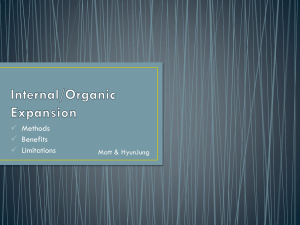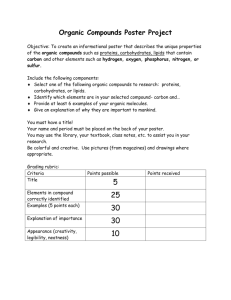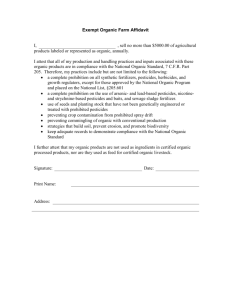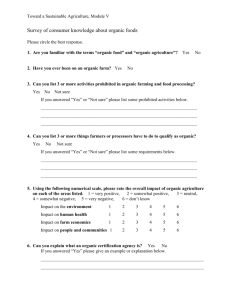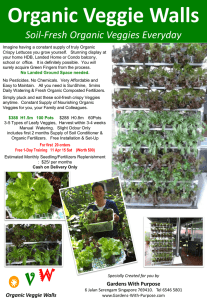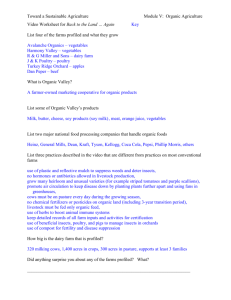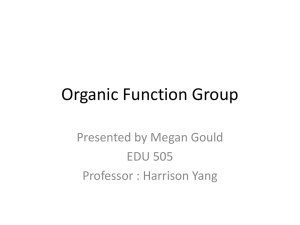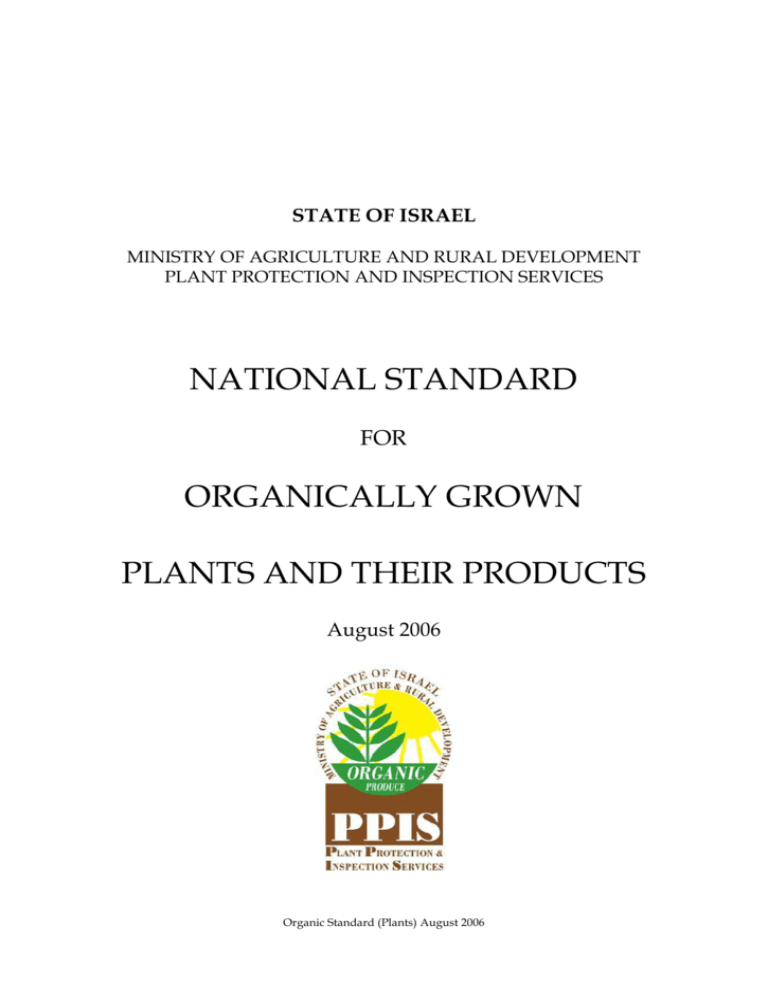
STATE OF ISRAEL
MINISTRY OF AGRICULTURE AND RURAL DEVELOPMENT
PLANT PROTECTION AND INSPECTION SERVICES
NATIONAL STANDARD
FOR
ORGANICALLY GROWN
PLANTS AND THEIR PRODUCTS
August 2006
Organic Standard (Plants) August 2006
ORGANIC STANDARD
PPIS-ISRAEL
The Ministry of Agriculture and Rural Development
The Plant Protection and Inspection Services
P.O. Box 78, Bet Dagan 50250
ISRAEL
Telephone: (+972 3) 9681500/01
Facsimile: (+972 3) 9681507
E-mail: ppis@moag.gov.il
http://www.ppis.moag.gov.il/ppis/
Copyright © 2006 by PPIS
All rights reserved. No part of this publication may be used or reproduced in any
manner without the prior written permission of the copyright holder (The Ministry
of Agriculture, The Plant Protection and Inspection Services).
B
Organic Standard (Plants) August 2006
ORGANIC STANDARD
PPIS-ISRAEL
FOREWORD
This Standard is an updated version of the Israeli Standard published in 2001. The
standard applies only to organic produce of plant origin and is in compliance with
EEC Regulation 2092/91 and its amendments. Its international compatibility enables
the Israeli organic fresh and processed products to be in compliance with agreed
international criteria and thus, guarantee safe and credible organic production for
export and for the domestic market.
The updated Standard clearly defines the minimum requirements for organic produce
and products of plant origin, and for their labeling with the word “organic” and with
the organic logo. It also defines rules for the use of logos of Inspection Bodies
accredited by the PPIS to control organic production in accordance with this
Standard.
This Standard is an official and obligatory document, aimed at ensuring
standardized implementation of the organic agriculture objectives by:
Enhancing biological activity within farm systems;
Preservation and improvement of soil fertility for future generations;
Maintaining, as far as possible, a closed production cycle;
Reduction of agriculture-caused environmental pollution;
Minimizing the use of non-renewable natural resources;
Protecting the natural environment and preserving it.
The Standard provides an efficient and recommended working tool for organic
production designated for export as well as for the domestic market.
C
Organic Standard (Plants) August 2006
ORGANIC STANDARD
PPIS-ISRAEL
CONTENTS
Forward
Contents
General Notes
1.
Scope
2.
Definitions
3.
Production System Requirements
3.1
Introduction
3.2
Conversion to Organic Agriculture
3.3
Seed and Propagation Material
3.4
Soil Improving Agents and Water Management
3.5
Soil Cultivation
3.6
Plant Protection
3.7
Mixed Farming
4.
Handling of Organic Produce / Products
4.1
Introduction
4.2
Packaging
4.3
Sanitation
4.4
Storage and Transportation
4.5
Processed Food
5.
Inspection, Approval, and Certification System
5.1
Certification of Inspection Bodies for Organic Produce
5.2
Control of Operators Engaged in Organic Production
5.3
Inspection Principles
5.4
Organic Produce Certification Principles
6.
Labeling and Advertising Organic Produce
6.1
Labeling Principles
6.2
Labeling with the word “Organic”
6.3
Labeling with the words “In Conversion to Organic”
7.
Import
8.
Sanctions
9.
Appeals
C
D
E
1
2
3
3
3
5
6
7
7
8
8
8
9
9
9
10
11
11
11
12
13
13
13
14
14
15
15
16
Annexes
Annex I
Table 1:
Table 2:
Table 3a:
Table 3b:
Table 4:
Annex II
Annex III
17
18
20
22
23
24
24
24
Substances Permitted in Organic Plant Production
Soil Fertilizers and Conditioners
Plant Protection Products
Ingredients of Non-Agricultural Origin
Aids for Processing Food Ingredients of Organic Origin
Ingredients for Post-Harvest Treatments
Approved Foreign Language Labeling Terms
PPIS Organic Logos
D
Organic Standard (Plants) August 2006
ORGANIC STANDARD
PPIS-ISRAEL
GENERAL NOTES:
1.
This Standard prepared by the Plant Protection and Inspection Services (PPIS)
of the Ministry of Agriculture and Rural Development.
2.
It lays down the minimum requirements with which all operators dealing
with organic agricultural fresh produce, or processed products, must comply.
3.
Compliance with this Standard enables labeling with the word “organic”.
Such labeling does not guarantee healthier or more tasteful food.
4.
The Standard aims:
5.
to protect consumers of organic produce against deception and
fraud and promote fair competition by clearly distinguishing
those products produced according to the Standard from those
produced by other means;
to protect producers of organically grown plants or organic
plant products against misrepresentation of conventionally
produced agricultural products as being organic;
to harmonize national provisions for the production,
processing, identification, labeling and certification of organic
fresh produce and organic processed products;
to ensure that all stages of production and marketing are
subject to inspection and found to comply with the
requirements of this Organic Standard;
to establish a transparent reliable framework for the organic
agriculture industry and provide clear guidelines to organic
operators as well as to Inspection Bodies operating in organic
agriculture;
to enhance awareness of ecology, nature preservation and the
environment;
to make sure that the reliability of the organic produce and
products is maintained, and is verifiable, throughout the
production and all along the marketing chain;
to promote trade in organic products by building confidence in
them through the adoption of harmonized standards.
The basic goal of organic agricultural systems is to optimize quality
production without resorting to artificial or synthetic fertilizers, chemical
pesticides, or other chemicals.
Organic agriculture stresses guarding and nurturing the land for future
generations, using renewable resources, conserving energy, soil and water and
protecting the environment. The production cycle should be as closed as
E
Organic Standard (Plants) August 2006
ORGANIC STANDARD
PPIS-ISRAEL
possible, with minimal use of external inputs. The immediate objective is to
reach systems that are as natural as possible and sustainable.
6.
A conversion period from conventional to organic agriculture is imperative,
and must be well defined and supervised by a certified Inspection Body.
7.
All those operating in the production and marketing of organic
produce/products, whether for export or for domestic market, must comply
with this Standard.
8.
The Standard alone cannot guarantee that organic products are absolutely
free from residues of chemicals or other contaminants, whether pollution is
via air, water, soil or other sources beyond the producer's control. However,
application of practices permitted by this Standard will ensure the lowest
possible risk of residues.
9.
In order to monitor compliance with this Standard effectively, the necessary
requirements and guidelines for inspection are outlined in it. Continued
approval of all operators in organic agriculture, whether engaged in
production, processing, transport, storage, sale, or handling, is conditioned
upon their maintaining accurate records of all their activities, and upon
making these available to inspectors at any time.
10.
All the requirements included in this Standard are in addition to all the
requirements stipulated in legislation and regulations concerning health,
agriculture and food and protection of the environment.
11.
All operators in the industry must comply with all the laws and regulations
governing the use of substances approved for plant growing and for food and
feed production.
12.
This Standard is a minimum standard and is valid as long as it has not been
updated.
13.
This Standard is subject to amendment and modification in the light of new
information or further technological changes. Review or modification of any
aspect may be requested by submitting a written proposal including detailed
reasons to the Director, Plant Protection and Inspection Services (PPIS),
Ministry of Agriculture and Rural Development. Such requests will be
discussed at the authorized forum, while considering organic agriculture
principles, the law and bilateral agreements.
14.
The Plant Protection and Inspection Services (PPIS) are the competent
authority and sole accreditation body authorized to approve inspection
bodies for organic production.
F
Organic Standard (Plants) August 2006
ORGANIC STANDARD
PPIS-ISRAEL
1.
SCOPE
1.1
This Standard applies to products, which carry the labeling “Organic”, or are in
conversion processes to organic farming, and are in conformity with the
following:
a)
unprocessed plants and plant products;
b)
processed plants products.
1.2
A product will be regarded as “Organic” if it has been produced in
compliance with this Standard, inspected, and approved by an authorized
inspection body. Such product may be labeled/advertised by the term
"organic" in Hebrew or in one of the foreign languages listed in Annex II.
1.3
Every product complying with the requirements of this Standard may be
labeled or advertised using the official organic logo (see Annex III).
1.4
The following products and by-products are incompatible with the principles of
organic agriculture and are therefore not permitted under this Standard:
a) Products derived from genetic modification technology;
b) Products treated with ionizing radiation.
1
Organic Standard (Plants) August 2006
ORGANIC STANDARD
PPIS-ISRAEL
2. DEFINITIONS
For the purposes of this Standard:
Certification means the procedure by which an authorized Inspection Body
confers written assurance that an operator conforms to this Standard, based on
inspection of production practices, product sampling and examination of
records.
Competent Authority means the Plant Protection Inspection Services (PPIS)
in the Ministry of Agriculture and Rural Development of the State of Israel.
Director means the Director of PPIS.
Genetically Modified Organism (GMO) means any product or an ingredient
of a product, produced using biotechnological methods to alter the genetic
structure of living matter in a way that is not natural, or in a way which is not
natural cross fertilization
Ingredients means substances, including additives, used in processing and
present in the final product, either in its original form or as a derivative
thereof.
Inspection & Certification Body means an organization authorized by PPIS
to inspect and certify operators, which are in compliance with this Standard.
Inspector means a person employed by an Inspection Body to check operators
in organic produce for certification purposes.
Logo means the official logo for organic products (see Annex III).
Marketing means offering a product for sale, selling, displaying for sale,
delivering or placing on the market in any other form.
Marking means marking of packages and/or labeling the products with
specifically designated organic logos. (see Annex III).
Mixed Farm Unit means a farm in which both organic and conventional
production units are operating.
Official Auditor means a person or persons deemed to have the expertise and
experience, and authorized by the PPIS to independently examine the activities
of inspection bodies or operators for compliance with this Standard.
Operator means any person who produces, processes, prepares, marks,
handles, stores, packages, transports, retails, displays, markets, imports or
exports products covered by this Standard.
2
Organic Standard (Plants) August 2006
ORGANIC STANDARD
PPIS-ISRAEL
Organic Product means produce/product produced according to this Standard
and certified by an Inspection Body.
Organic means the label used to mark products produced in compliance with
this Standard, or with a standard that is at least equivalent to it.
Parallel Production means growing an identical cultivar, or different
cultivars, which are visually undistinguishable, in an organic unit and a
conventional unit of the same Mixed Farm.
PPIS refers to the Plant Protection and Inspection Services of the Ministry of
Agriculture and Rural Development of Israel.
Seed means seed, seedling and any part of a plant used for propagation.
3.
REQUIREMENTS FROM PRODUCTION SYSTEM
3.1
Introduction
3.1.1 The aim of the Standard is to verify that an operator producing an
organic product of plant origin is in conformity with the principles of
organic agriculture laid down in the standard.
3.1.2 The principles of organic agriculture are reflected through practices
that contribute to enhance biological activity in the soil, as indicated by
humus level, aggregate structure and root system development, such
that plants are nourished through the soil ecosystem rather than by
soluble chemical fertilizers. Plants grown in organic systems take up
nutrients released slowly from humus colloids at a rate governed by
temperature. Thus, plant metabolism and ability to assimilate nutrients
are not overstressed by excessive uptake of soluble salts.
3.1.3 Organic agriculture relies to the maximum extent feasible upon crop
rotation, legumes, green and animal manures, mechanical cultivation,
mineral-bearing rocks and biological control, all helping to maintain
soil productivity, supply plant nutrients and manage diseases, insects,
weeds and other plant pests.
3.2
Conversion to organic agriculture
3.2.1 Changing from conventional to organic agriculture requires a
conversion period. The aim of such a period is to facilitate the
transition of conventional production factors to organic farming while
checking feasibility and adapting the operators to such conversion.
3.2.2 The principles of this Standard shall apply to every field converted
from conventional to organic agriculture. Throughout the conversion
3
Organic Standard (Plants) August 2006
ORGANIC STANDARD
PPIS-ISRAEL
period, the entire production process is subject to inspection of an
authorized inspection body.
3.2.3 Areas in the process of conversion or those already converted must not
be alternated between organic and conventional production methods.
3.2.4 The conversion period for annual crops will last two years until
sowing/planting and three years for perennials before the produce will
be certified as organic.
3.2.5 The conversion period will start on the day the application documents
are received by the Certification Body (CB), provided the CB carried
out a field inspection within 30 days from receiving the application
documents and the field inspection results is proved to be faultless.
3.2.6 The Inspection Body must take soil samples for chemical residues
analysis at the beginning and at the end of the conversion period, in
order to verify that the residue level at the end of the period do not
exceed the levels at the beginning.
3.2.7 The conversion period may be shortened only in cases describe in the
following table:
Possible cases
Required
conditions
Conversion
reduction
Responsible
body
Matching with
growing season
Compliance
with the
standard
Up to 3 months
The inspection
and certification
body
Land not cultivated
for a period of at
least 3 years
New grower
Up to 12 months
The inspection and
certification body
after written
notification to the
competent authority
Up to 24 months
The inspection and
certification body
after written
notification to the
competent authority
Satisfactory proof
has been provided*
Chemical residues
in soil do not
exceed 0.15 ppm
Land not cultivated
for a period of at
least 3 years
Experienced
grower
Satisfactory proof
has been provided
Chemical residues
in soil do not
exceed 0.15 ppm
Derogations
All other cases
-
The competent
authority
(*) An approval may be considered only after submission to the Inspection
Body of aerial photographs in which the relevant field is clearly identifiable.
4
Organic Standard (Plants) August 2006
ORGANIC STANDARD
PPIS-ISRAEL
3.2.8 Termination of a conversion period and approval of converted units as
adequate for organic agriculture will be determined by the Inspection
Body.
3.2.9 Annual crops will be marketed as organic only if sown or planted after
the conversion period. Perennial crops will be marketed as organic only
after the conversion period.
3.2.10 The inspection body may extend the conversion period at its discretion.
3.2.11 In case of organic fields which have been treated with substances that
are not approved for organic agriculture by order of a legal authority,
the duration of the conversion period will be decided by the Competent
Authority, upon consideration of the following:
(a) The degradability of the pesticide. (b) The termination date of the
conversion period, if the soil is under conversion.
3.2.12 Fields converted to organic in a mixed farm unit must be
distinguishable and run separately from fields not undergoing
conversion. Signs with the wording “in conversion to organic farming”
and the grower’s name will be clearly placed at the boundaries of fields
in conversion.
In a mixed farm units there must be clear evidence that organic and
conventional fields are managed and cultivated separately.
3.3
Seed and propagation material
3.3.1 The source of seed and all other propagation material will be from
plants grown in accordance with the principles of this Standard, or – in
the case of import – from an organic source holding a valid
certification.
3.3.2 Propagation material for annual crops will be considered organic if its
mother plants have been grown in compliance with this Standard, in
fields approved by an Inspection Body.
3.3.3 Seed originated in Israel will be considered organic if their mother
plants have been grown in compliance with this Standard for one
cropping season at least.
3.3.4 Cuttings for perennial crops will be considered organic if taken from
mother plants that have been grown in compliance with this Standard
for two seasons at least.
3.3.5 Organic originated seeds should be used unless it has been proven, and
confirmed in writing by the Inspection Body, that such seeds are
commercially unavailable. Such a confirmation will be valid for a
specific crop and for a single cropping season. In such a case the seeds
may be used under the following conditions (in descending priority
order):
5
Organic Standard (Plants) August 2006
ORGANIC STANDARD
PPIS-ISRAEL
a) The seeds have not been treated with a disinfectant.
b) The seeds have been treated with disinfectants included in
Annex I.
c) The seeds have been treated with disinfectants not included in
Annex I but such treatment is required by Plant Protection
regulations
3.3.6 Propagation material originated from genetically modified plants must
not be used.
3.4
Fertilizers soil conditioners and water management
3.4.1 Organic matter should be returned to the soil to maintain or increase
humus content. Use of mineral fertilizers (as listed in Annex I) should
be a supplement and not a substitute for soil conditioning.
3.4.2 Soil fertility and biological activity will be maintained or increased by
applying the following:
-
Growing legumes (green manure) as part of a crop
rotation program.
incorporation of fully composted organic matter
derived from those sources listed in Annex I.
soil tillage.
3.4.3 Manure or farmyard waste from animal husbandry must undergo
compostation. For compost activation, suitable microorganisms or
plant-based preparations may be added, as well as rock dusts listed in
Annex I.
3.4.4 All compost used in organic production must be certified.
3.4.5 Mulch applied directly to the soil surface does not have to be
composted first, but its use must be documented.
3.4.6 Substances originated from genetic engineering, urban waste, sludge,
or chemically treated wood waste must not be used in compost
production.
3.4.7 Other organic or mineral fertilizers listed in Annex I may be used only
where nutrients or soil conditioners cannot be added to the soil in the
way described in clause 3.4.2.
3.4.8 Like soil, water is a primary production input in agriculture. Care
should be exercised to make sure that irrigation is carried out by water
saving systems, in order to prevent wastage, leaching of substances into
deep soil layer, and ground water contamination.
3.4.9 Only water approved by the Water Commission of Israel for use in
agriculture may be used for irrigation. The use of recycled water is
permitted only if the water has been purified by an effective bio-system
and returned into the water system in compliance with the law.
6
Organic Standard (Plants) August 2006
ORGANIC STANDARD
PPIS-ISRAEL
3.4.10 Irrigation systems used for organic fields will be secured and separate
from the general system. Every precaution must be taken to make sure
that prohibited substances do not contaminate irrigation water.
3.4.11 Adequate valves must be used in order to make sure that a system
carrying water to organic fields is protected at the pipe beginning from
penetration by unwanted substances like fertilizers.
3.4.12 Water shall not be, in any case, produced or marketed under the label
“Organic”.
3.5
Soil cultivation
3.5.1 Organic crops must be based in soil. No detached media may be used.
3.5.2 Use of organic substrate for mushroom cultivation may be allowed,
subject to the discretion of the Inspection Body, and only if the
compost content in the substrate does not exceed 25 percent.
3.5.3 Remains of plant material (such as straw/hay stubble) may not be
burned. It must be buried in the ground or removed to recycling sites.
3.5.4 Atmosphere enrichment with carbon dioxide is not allowed in organic
production.
3.5.5 All precautions must be taken in order to prevent the risk of a drift
caused by spraying, or any other activity that may cause pollution.
3.5.6 In open fields, the distance between organic plots and adjoining
conventional ones will be 30 meter at least. The distance from
adjoining plots that are sprayed from the air will be 200 meter at least.
3.5.7 All soil tillage operations will be carried out in such a way as to
prevent soil erosion.
3.6
Plant protection
3.6.1 Plant protection methods in organic agriculture are different from those
used in conventional agriculture. Organic agriculture does not rely on
using plant protection products and prefers the application of methods
that do not harm the environment.
3.6.2 The use of products approved for organic agriculture (see the booklet
“Approved Products for Organic Agriculture”) may be permitted only
in cases of imminent danger or when no alternative is available.
Precaution must be taken when using such products, in order to prevent
a drift caused by spraying, or any other external pollution.
3.6.3 Many diverse solutions are available for plant protection problems.
Plant pests may be controlled using any of the following:
-
choice of appropriate plant species and varieties;
-
biological control;
-
crop rotation;
7
Organic Standard (Plants) August 2006
ORGANIC STANDARD
3.7
PPIS-ISRAEL
-
resistant plants or rootstocks;
-
soil solarization or steam sterilization;
-
mechanical controls such as traps and barriers;
-
physical controls including light and sound;
-
mechanical cultivation;
-
mulching and mowing;
-
livestock grazing;
-
attraction or release of natural enemies;
-
flame and steam weeding.
Mixed farming
3.7.1 A mixed farm is a farm in which there are production units of organic
crops and of conventional ones. (Any partnership, company,
corporation, or other legal entity, that owns both organic and
conventional production units shall be deemed as a mixed farm.)
3.7.2 Running parallel production in a mixed farm is forbidden.
3.7.3 Organic production unit will not be adjacent to conventional
production unit and must be managed separately. All agrotechnical
treatments, harvesting, grading and packaging will be completely
separated.
3.7.4 Accurate, and separate, records of all expense and income accounts
(including separate invoices), usage of inputs, and quantities and
destinations of marketing, should be kept. All relevant documents must
be available for the Inspection Body at all times.
3.7.5 All production units, organic and conventional, must be under the
control of the Inspection Body.
3.7.6 A cooperative farm, or a corporation of cooperative farms, may run
parallel production, only if the production, management, procurement
and marketing systems are kept fully separated.
4.
HANDLING OF ORGANIC PRODUCE/PRODUCTS
4.1
Introduction
4.1.1 In order to preserve product identity and integrity from producer to
consumer, all stages of handling, treatment, processing, packing and
storage of organic produce, raw materials and inputs must be carried
out in compliance with this Standard and in a manner preventing
contamination, contact, mixing or substitution with materials that are
not organic or incompatible with this Standard.
8
Organic Standard (Plants) August 2006
ORGANIC STANDARD
PPIS-ISRAEL
4.1.2 No products or substances originating from genetic engineering may be
used under any circumstances. Ionizing irradiation may not be used.
4.1.3 Handling of organic products, and all related activities, must be kept
separate, in space and time, from activities concerning non-organic
products.
4.2
Packaging
4.2.1 Packaging and packing material must conform to those of food-grade
standards as established by national and international regulations and
should preferably be recyclable.
4.2.2 Packaging of organic produce will be carried out in full separation
from any activity concerned with non-organic products or substances.
4.2.3 Packing materials must be new and clean.
4.2.4 No packing materials containing PVC may be used.
4.3 Sanitation
4.3.1 Pre-cleaning with permitted materials of all equipment, surfaces and tools
must be ensured.
4.3.2 The use of chemicals should be avoided by implementation of adequate
production processes, and hygiene and sanitation procedures.
4.3.3 The use of disinfectants and sanitizers must be followed by a thorough rinsing
with water to prevent residues that may contaminate the food products.
4.3.4 Mechanical, physical and biological methods should be preferred for
pest management, including sound, ultra-sound, light, temperature and
traps. The use of the pesticides listed in Table 2 of Annex I is allowed.
4.3.5 Use of pesticides not listed in Annex I is prohibited on products
meeting this Standard and would cause such products to lose their
organic status and label.
4.3.6 Irradiation is not permitted as a pest control measure under the organic
system.
4.4
Storage and transportation
4.4.1 Separate areas must be designated for organic
produce/products/materials and for non-organic
produce/products/materials.
4.4.2 Unpacked organic produce will be stored/ transported separately from
produce that does not comply with the requirements of this Standard.
The organic produce will be clearly marked “Organic”.
4.4.3 Transportation of organic produce will always be accompanied by a
detailed delivery note bearing the wording “Organic”.
9
Organic Standard (Plants) August 2006
ORGANIC STANDARD
PPIS-ISRAEL
4.4.4 Packed organic produce will carry a traceability code, and will be
clearly labeled with the details listed in Chapter 6 (Labeling).
4.4.5 Pest control operations carried out in storage sites or in containers
intended for transportation may include physical barriers or other
treatments allowed according to the provisions of this Standard.
4.4.6 Produce/products of organic origin must not be stored in any site where
prohibited volatiles are present.
4.5
Processed food
4.5.1 Processing aids and additives of non-agricultural origin used in food
processing are listed in Table 4 of Annex I. Since consumers expect
organic production systems to use only natural substances, the use of
those substances will be limited to the following cases:
-
The substances are essential for securing food safety.
The substances are essential in the preparation or
preservation processes of the food, or are required by
law.
4.5.2 The following processes are allowed in organic food processing:
Mechanical, physical and biological processes, including filtration,
smoking, extraction and sedimentation.
4.5.3 Food processing is allowed only on a site in which complete separation
exists throughout the production process between organic and
conventional products and processes.
4.5.4 Notwithstanding the details mentioned in paragraph 4.5.1, agricultural
ingredients of non-organic origin may be allowed in the preparation of
processed organic products of plant origin, provided the total amount
of such ingredients will not exceed 5 percent of all the ingredients of
the final product (water and salt excluded), and provided:
a) Those ingredients are listed in Annex I.
b) The Inspection Body has confirmed that those ingredients are
not sufficiently available.
c) Their origin is not in genetic engineering, nor had they been
subjected to ionizing irradiation.
d) Identical ingredients originated in organic and non-organic
sources, may not be used.
4.5.5 Storage areas designated for organic raw materials and organic end
products should be separate and clearly marked with the word
“Organic”.
10
Organic Standard (Plants) August 2006
ORGANIC STANDARD
PPIS-ISRAEL
5.
INSPECTION, APPROVAL AND CERTIFICATION SYSTEMS
5.1
Accreditation of Inspection Bodies for organic produce
5.1.1 The PPIS is the sole certifying organization in Israel, authorized to
approve inspection bodies for inspecting organic agricultural produce.
An inspection body applying for certification must comply with all
PPIS requirements relevant to certification and ISO 65 requirements,
and to abide by all rules in accordance with the provisions of this
Standard.
5.1.2 A violation of the provisions of the agreement between the PPIS and an
inspection body will result in cancellation of the certification, and
revocation of the rights to issue organic certificates and the use of
organic logo.
5.2
Control of operators involved in organic production
5.2.1 An Inspection Body must certify all operators engaged in organic
production.
5.2.2 The Inspection Body and the operator will sign up a contract in which a
commitment to operate in compliance with the requirements of this
Standard will be stipulated.
5.2.3 An operator wishing to start an inspection process must submit to the
Inspection Body the following:
a) Name and address, including location and detailed description
of the site.
b) Definition of the legal entity of the operator.
c) A full description of all activities taking place at the site, and
an assessment of potential risks from nearby neighborhood.
d) A detailed list of all raw materials concerned with the site
operation, and specification of the finished products.
e) An operator who is a grower will provide the Inspection Body
with complete information about the history of the land parcel,
including the last date on which substances incompatible with
this Standard were applied.
f) Any operator involved in production of processed foodstuff
must have in his possession a relevant license issued by the
health authorities.
g) The operator will keep on site a folder containing the following
well organized records: a detailed map showing growing,
production, storage and packing areas and facilities, and all
documents relating – either directly or indirectly – to activities
concerning organic production, such as documents of inputs
11
Organic Standard (Plants) August 2006
ORGANIC STANDARD
PPIS-ISRAEL
purchases, marketing documentation, import documentation
and operative log-books.
h) A copy of this Standard.
i)
Procedures specifying in detail all the steps taken to ensure
compliance with the requirements of this Standard.
j)
Each mixed farm, in which organic or in-conversion-to-organic
produce and conventional produce are handled, will have
procedures and work instructions aimed at ensuring complete
separation in time and space.
k) The Inspection Body must have free access, at any time, to
every place on the site as well as to all documents needed for
performing inspection.
l)
Any case of deviation from this Standard, whether by mistake
or from any other reason, must be reported immediately in
writing to the Inspection Body. The Inspection Body will
examine the nature of the incident and act accordingly.
m) Once a year, on a date determined by the Inspection Body, the
client will submit to the Inspection Body a yearly forecast,
including operational plans and all other information relating to
organic growing, production or marketing. Every change in the
forecast will be reported in writing to the Inspection Body.
5.3
Inspection principles
5.3.1 Inspection of operators engaged in organic produce/products will be
carried out parallelly in various ways such as documents examination,
physical checks on site, and laboratory analysis. All documents relating
to organic inspection will be kept in an orderly manner, on the
operator’s site, for 3 years at least.
5.3.2 When applying for inspection or certification the operators must
provide all the information itemized under clause 5.2.3 above.
5.3.3 Subsequent to the reception of the application, including all the
required details, by the Inspection Body, first inspection will take place
at the operator’s, during which the application will be reviewed in
order to verify it, to amend all omissions or discrepancies, and to
examine all relevant documents and records. The risks of possible
deviation will be assessed as well. A detailed inspection report will be
prepared at the end of the visit, including comments and
recommendations.
5.3.4 Coordinated routine inspection on the client’s site will take place at
least annually. Additionally, unannounced visits will be take place
every year at 10 percent of the clients at least. A detailed inspection
report will be prepared at the end of each visit, including comments
and recommendations.
12
Organic Standard (Plants) August 2006
ORGANIC STANDARD
PPIS-ISRAEL
5.3.5 The inspection report will describe in detail all the issues examined, the
problems discovered and the measures needed for their rectification.
The inspector and the operator will sign the report.
5.3.6 The Inspection Body will prepare an annual sampling program for
testing possible residues of prohibited substances. The plan will be on
product/client/season basis, and will be submitted to the competent
authority for approval. Additionally, random samples at a rate of 5
percent of the operators will be taken every year by the inspection
body. The samples will be analyzed by laboratory authorized by the
PPIS for the organic scope.
5.3.7 Control of inputs and outputs will also be achieved through relevant
documents like purchase invoices and delivery notes. The operator
must make certain that such documents are filed in a designated folder
and are available to the Inspection Body at all times.
5.3.8 In the event of a deviation from the provisions of this Standard, the
Inspection Body will impose sanctions in accordance with chapter 8
(Sanctions) and the procedures of the Inspection Body.
5.4
Organic produce certification principles
5.4.1 The Inspection Body is authorized to issue a certificate confirming that
a produce complies with the requirements of the Organic Standard only
after verifying that all the details included in Chapter 5 are fully
respected and the produce/product is in compliance with all the
provisions of the Organic Standard.
6.
LABELING AND ADVERTISING ORGANIC PRODUCE
6.1
Labeling principles
6.1.1 Labeling and advertising produce or products as organic are allowed
only if their production, processing, packing, storing and handling
comply with the requirements of this Standard.
6.1.2 Labeling of organic products must adhere to the Israeli labeling
legislation. In addition, the following details must appear:
-
-
the word “Organic” in Hebrew (for the domestic
market) or “organic” in English, or an equivalent
term listed in Annex II;
the name and identity code of the grower / producer /
exporter;
on a processed product – a traceability code;
the name and logo of the approving inspection body;
13
Organic Standard (Plants) August 2006
ORGANIC STANDARD
-
-
PPIS-ISRAEL
Israeli production approved by an inspection body
will be marked with the organic logo and the logo of
the inspection body.
imported produce in accordance with Chapter 7
(Import) may be labeled with the organic logo.
6.1.3 The organic logo may be used in advertising.
6.1.4 In the event of non compliance with the provisions of this Standard an
operator will be denied of the right to label with the word “Organic”
and to use the logo of the competent authority
6.1.5 No marking or statement may be made on the packaging or label, or in
any advertisement of organic produce / products, claiming or implying
that those products have beneficial influence on public health, or
superior organoleptic character or nutritious quality.
6.2
Labeling with the word “organic”
6.2.1 The label “organic” will appear on the packaging, or on a label attached
to the product, or in any other way including advertising material only
if:
a) The product and/or its ingredients have been inspected in
accordance with the requirements specified in Chapter 5 or in
accordance with requirements specified in Chapter 7 (Import).
b) All substances used during production and processing are
permitted according to this Standard.
c) The product or its ingredients have not been subjected to
ionizing irradiation.
d) The product or its ingredients have not been produced using
genetic modification processes.
6.2.2 Processed products of plant origin may be labeled “Organic” even if
some agricultural ingredients of non-organic origin have been used,
provided the total amount of such ingredients does not exceed 5
percent of the total content of the finished product (salt and water
excluded).
6.2.3 Processed products of which the total ingredients of non-organic origin
exceeding 5% must not be marked by the term "organic".
6.3
Labeling with the words “Organic in Conversion”
6.3.1 Produce of growing areas that have been managed in accordance with
organic agriculture rules and inspected by a certified Inspection Body,
and are in conversion to organic methods for one year at least, may be
labeled in conversion to organic farming.
14
Organic Standard (Plants) August 2006
ORGANIC STANDARD
PPIS-ISRAEL
6.3.2 Processed products manufactured from a single plant ingredient that is
still in conversion, will be labeled “Made from Produce in Conversion
to Organic Farming”.
7.
IMPORTS
7.1
Imported fresh produce, products or raw materials covered within the
scope of this Standard may be used for the processing of an organic
product in Israel or be marketed as organic, provided they accompanied by
an original document issued by an Inspection Body that has been approved
by the competent authority, confirming that:
-
it was produced according to production methods
equivalent to those specified in Chapter 5.
It was labeled according to rules equivalent to those
specified in Chapter 6.
The importer is certified in accordance with
requirements laid down in section 5.2.
7.2
The certificate mentioned in section 7.1 must be original and accompany
the consignment until it reaches the importer. The importer must keep the
certification for three years ay least, and make it available for inspection
upon request.
7.3
Certification for importation of organic products will be canceled in any
event of infringement of the requirements of this standard or any deviation
from them by an importer.
8.
SANCTIONS
An Inspection Body must take sanctions against operators found to be in
violation of this Standard. The Inspection Body must notify the PPIS in the
event of a substantial violation.
8.1
Inspection report on an operator, which includes comments on any
irregularities or deviation from the standard must also include given timetable
for correction.
8.2
Non-compliance with the terms specified in section 8.1, or with the given
timetable, will lead to sanctions against the operator.
8.3
The Inspection Body will impose sanctions against an operator violating the
requirements of this Standard or deviating from them. The sanctions will be in
accordance with written procedures and in relation with the violation severity.
8.4
According to the certification agreement between PPIS and the Inspection
Body, substantial violations will be handled by PPIS in accordance with its
procedures.
8.5
In case of suspension, the operator will be denied of the privilege to use the
organic symbol and the logo of the Inspection for the duration of suspension.
15
Organic Standard (Plants) August 2006
ORGANIC STANDARD
9.
PPIS-ISRAEL
APPEALS
An operator may appeal on decisions as regard to sanctions.
-
An appeal concerning a sanction imposed by the Inspection
Body will be submitted to the Inspection Body and handled
by the proper forum within that organization.
-
An appeal concerning a decision or a sanction imposed by
the competent authority will be submitted to the Appeal
Committee appointed for this purpose.
The appeal Committee will determine its own work procedures, and
its ruling will be final.
16
Organic Standard (Plants) August 2006
ORGANIC STANDARD
PPIS-ISRAEL
ANNEX 1
SUBSTANCES PERMITTED IN ORGANIC PLANT PRODUCTION
Explanatory comments to the lists of substances appearing in the following tables
1.
Use of any substance in an organic production system for fertilization or
soil conditioning, pest control, or during post-harvest treatment,
preparation, processing, preservation or storage, must comply with all
laws, regulations, and international agreements
2.
All substances listed in the tables below and their commercial
formulations were approved by the competent authority
(PPIS).
3.
Any change or amendment requires approval by the PPIS
prior to inclusion.
4.
Use of inputs for agricultural crop production should be
based on an assessment of need and be administered with
care and the knowledge that even permitted substances are
subject to misuse, could be toxic and may adversely affect the
environment and/or farm ecosystem.
5.
Use of any substance may have unwanted implications with
regard to residues and pollutants. Every use, of every
substance must be documented in the operators’ folder.
6.
Use of liquid products, such as those originated in the sea,
must be with great caution as those products are usually
applied in big quantities and high concentrations.
7.
Micro-elements will be used only where it has been proven
that they are essential.
17
Organic Standard (Plants) August 2006
ORGANIC STANDARD
PPIS-ISRAEL
TABLE 1: FERTILIZERS AND SOIL CONDITIONERS
SUBSTANCE
DESCRIPTION; COMPOSITIONAL REQUIREMENTS;
CONDITIONS OF USE
Farmyard manure
Dried farmyard manure and
dehydrated poultry manure
Mixed animal excrements, and be Mixed animal
excrement, and bedding of plant origin, after
compostation or fermentation. Competent authority’s
approval is needed.
Originated in extensive farming, after compostation or
fermentation. Competent authority’s approval is needed.
Composted animal
excrements, including poultry
and farmyard manures
Originated in extensive farming. Competent authority’s
approval is needed.
Slurry and urine
Only after fermentation or dilution. Originated in
extensive farming. Competent authority’s approval is
needed.
For nurseries and gardening only.
Peat
Perlite, Vermiculite, etc.
Insects and worms products
Humus
Guano
Competent authority’s approval is needed.
Composted plant residues
Competent authority’s approval is needed.
Products and by-products of
animals
Competent authority’s approval is needed.
Including: blood meal, hoof meal, horn meal, fish meal,
bone meal, feather meal, meat meal
Wool, fur, hair, milk products.
By-products of plant
processing
Seaweeds and seaweed
products
Competent authority’s approval is needed.
Wood sawdust and shavings
With no chemical treatment
Composted wood bark
With no chemical treatment
Wood ash
With no chemical treatment
Phosphate rock
Cadmium content not exceeding 90 mg/kg
Aluminium calcium phosphate
For basic soils only (pH>7.5). Cadmium content not
exceeding 90 mg/kg
Competent authority’s approval is needed.
Dross (waste metal left after
smelting)
Natural potash salts
SUBSTANCE
Competent authority’s approval is needed.
DESCRIPTION; COMPOSITIONAL REQUIREMENTS;
CONDITIONS OF USE
18
Organic Standard (Plants) August 2006
ORGANIC STANDARD
PPIS-ISRAEL
Potassium sulfate (may contain
Magnesium salts as well)
Competent authority’s approval is needed.
Olive waste
Excluding ammonia treated olive waste
Calcium carbonate of natural
origin (e.g. chalk, limestone,
phosphate chalk etc.)
Magnesium rock or calcium
rock
Of natural origin only. Competent authority’s approval is
needed.
Magnesium sulfate (Epsom
salt)
Calcium chloride solution
For foliar application in calcium deficiencies
Calcium sulphate (gypsum)
Of natural origin only
Industrial lime from vacuum
salt production
Competent authority’s approval is needed
Sulphur
Competent authority’s approval is needed.
Trace elements
Competent authority’s approval is needed.
Salt
Competent authority’s approval is needed.
Rock products
Such as basalt meal
19
Organic Standard (Plants) August 2006
ORGANIC STANDARD
PPIS-ISRAEL
TABLE 2: PRODUCTS FOR PLANT PROTECTION
Table 2 contains the following products:
Substances of plant or animal origin, microorganisms used for biological pest control,
Substances to be used in traps and/or dispensers, substances used for surface spraying
between plants, conventional substances used in organic agriculture and comply with
the requirements of the competent authority
SUBSTANCE
DESCRIPTION; COMPOSITIONAL REQUIREMENTS;
CONDITIONS OF USE
I. Substances of plant or
animal origin
Plant extracts such as Neem,
pyretrines, and Rotenone
extracs from Derris spp,
Lonchocarpus spp, and
Therphrosia spp.
Insecticides of plant extracts origin. Competent
authority’s approval is needed.
Bee wax
For the protection of pruning wounds
Gelatin
Insecticide
Hydrolyzed proteins
Insect attractants (combined with approved substances)
Lecithin
Fungicide
Oils extracted from plants such
as Mint oil, Pine oil, caraway
oil, etc.
Insecticides, fungicides, and acaricides. Growth
inhibitors.
II. Microorganisms used for
biological pest control
Microorganisms (bacteria,
viruses, fungi) such as Bacillus
thuringensis, Granulosis virus,
etc.
Provided they are not genetically modified
III. Substances used in traps
and/or dispensers
Diammonium phosphate
Insect attractant, to be used only in traps
Metaldehyde
Molluscide, to be used in traps containing repellents for
other animals
Insect attractants (for confusion purposes as well) to be
used only in traps
Insecticides, to be used only in traps, combined with
attractants
Pheromones
Pyrethroids (only deltamethrin
or lambdacyhalothrin)
SUBSTANCE
DESCRIPTION; COMPOSITIONAL REQUIREMENTS;
CONDITIONS OF USE
20
Organic Standard (Plants) August 2006
ORGANIC STANDARD
PPIS-ISRAEL
IIIa. Preparations to be
surface spread between
cultivated plants (Baits)
Iron orthophosphate
Molluscide
IV. Other Traditional
substances use in organic
farming
Copper compounds such as
copper sulphate (Bordeaux
mixture), copper hydroxide,
copper oxychloride, copper
oxide
Fungicides
Ethylene
For degreening of bananas, kiwis and kakis; Flower
induction of pineapple
Need recognized by the inspection body or inspection
authority
Insecticide
Potassium salt of fatty acids
(soft soap)
Potassium alum (Kalinite)
Prevention of ripening of bananas
Calcium polysulphide (lime
sulphur)
General pesticide, Competent authority’s approval is
needed.
Paraffin oil
Insecticude and acaricide
Potassium permanganate
Insecticide and fungicide
Quartz sand
Repellent
Sulphur
General pesticide
V. Other substances
Calcium hydroxide
Fungicide. Only in fruit trees, including nurseries to
control Nectria galligena
21
Organic Standard (Plants) August 2006
ORGANIC STANDARD
PPIS-ISRAEL
TABLE 3 a: INGREDIENTS OF NON-AGRICULTURAL ORIGIN
SUBSTANCE
DESCRIPTION; COMPOSITIONAL REQUIREMENTS;
CONDITIONS OF USE
Calcium carbonate
Lactic acid
Carbon dioxide
Malic acid
Ascorbic acid
Tocopherols
Lechithins
Citric acid
Tartaric acid
Sodium tartarate
Potassium tartarate
Monocalcium phosphate
Agar
Carageenan
Locust bean gum
Guar gum
Arabic gum
Xanthen gum
Glycerol
Pectins
Sodium carbonate
Potassium carbonate
Ammonium carbonate
Magnesium carbonate
Potassium chloride
Sodium chloride (salt)
Calcium sulphate
Magnesium chloride
Sodium hydroxide
Silicon dioxide
Argon
Nitrogen
Oxygen
Flavoring agents
Potable water
Salt
Microorganisms
Minerals
For every purpose but dyeing
Antioxidants
For raising flour
-
Plant extract
Unmodified
-
Surfactant
Stabilizer
Prevents crystallization in spices
Of natural origin only
Salts used for food processing (mainly sodium chloride or
potassium chloride
Unmodified genetically
Including vitamins, amino acids, and other nitrogenous
compounds, legally approved for use in the food industry
22
Organic Standard (Plants) August 2006
ORGANIC STANDARD
PPIS-ISRAEL
TABLE 3 b: AIDS FOR PROCESSING FOOD INGREDIENTS OF ORGANIC ORIGIN
SUBSTANCE
DESCRIPTION; COMPOSITIONAL REQUIREMENTS;
CONDITIONS OF USE
Water
Calcium chloride
Calcium carbonate
Calcium hydroxide
Calcium sulphate
Magnesium chloride
Potassium carbonate
Sodium carbonate
Citric acid
Sodium hydroxide
Sulphuric acid
Isopropanol
Carbon dioxide
Nitrogen
Ethanol
Tannic acid
Egg white albumin
Casein
Gelatin
Isinglass
Vegetal oils
Gelatinous or colloidal silicon
dioxide
Activated carbon
Talc
Bentonite
Kaolin
Diatomaceous earth
Perlite
Hazelnut shells
Rice meal
Beeswax
Carnauba wax
Microorganisms and enzymes
Coagulating agent
Coagulating agent
Coagulating agent
For drying raisins
For sugar production
For oil production and for starch hydrolysis
For oil and sugar production
For sugar production
For sugar crystallization
Solvent
Filtration aid
Greasing, releasing and foam-preventing agents
Releasing agent
Releasing agent
Unmodified genetically
23
Organic Standard (Plants) August 2006
ORGANIC STANDARD
PPIS-ISRAEL
TABLE 4: INGREDIENTS FOR POST HARVEST TREATMENT
SUBSTANCE
DESCRIPTION; COMPOSITIONAL REQUIREMENTS;
CONDITIONS OF USE
Ethylene
Natural waxed
Only for ripening of bananas
For produce coating
ANNEX II
APPROVED FOREIGN LANGUAGE LABELING TERMS
Danish:
Dutch:
English:
Finnish:
French:
German:
Italian:
Portuguese:
Spanish:
Swedish:
økologisk
biologisch
organic
luonnonmukainen
biologique
ökologisch
biologico
biológico
ecológico
ekologisk
ANNEX III
PPIS organic logos for products destined for export and for the domestic market
Logo for export
Logo for domestic market
24
Organic Standard (Plants) August 2006



